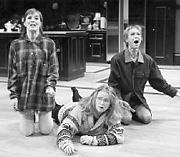FOR BETTER OR WORSE, most great plays fail the classic Hollywood pitch test. It’s hard to sum up the worth of, say, Hamlet, Death of a Salesman, or Master Harold and the Boys with a single-sentence synopsis that makes cash flash in an investor’s eyes. That’s because most great plays flow around and through their central idea, filling it out and strengthening it by considering its context and connotations.
The Smell of the Kill
Intiman Theater, ends August 5
So when a playwright actually has a great pitch for a change, it’s no wonder that directors, actors, and the occasional critic get a little starry-eyed. Michelle Lowe’s new play, The Smell of the Kill, has a great concept: Three wives, who’ve been meeting every month for the past 18 years so that their college-buddy husbands can reminisce, suddenly find themselves in an intriguing situation when their spouses accidentally lock themselves into a walk-in freezer. Should they do the “natural” thing and let their hubbies out? Or should they take a bit of time to review the flaws in their marriages and consider the potential joys of widowhood?
All three of the women, it’s revealed, have less than ideal unions. Nicky’s (Pamela Nyberg) husband has been indicted for embezzling, and she’s expected to quit her job to support him financially and emotionally. Debra (Cynthia Lauren Tewes) has a husband whom she claims to adore, but his real-estate dealings are so ruthless that he’s currently arranging to have their own house sold, despite her emotional attachments. And while Molly (Kristin Flanders) seems to dote on her husband, it’s soon revealed that their baby talk and endless endearments camouflage the fact that they’re no longer sleeping together.
Lowe’s concept is worthy of a great thriller or dark comedy, and Smell has the potential to be both. But the problem is that both genres require hermetically tight plotting and scrupulous stagecraft, and her writing simply isn’t up to the task. In her early scenes, for example, she wants to have several opportunities for two of the women to be alone so that they can talk behind the back of the third. So one after another, women are sent out the door on contrived errands: to retrieve some lipstick, tend to a crying baby, whatever. Ham-fisted, but forgivable. But you won’t believe the circumstances that lead each woman to lose her dress or blouse and reveal her underwear. And rarely has such a lot of palaver gone into an effect that, in the end, is so underwhelming: three actresses standing around talking in their slips.
LOWE ALSO FAILS to creatively develop the women’s dilemma. Given the husbands’ boorish behavior (we hear them destroying the living room during a game of indoor golf) and the gossip that each woman dishes, it’s clear from the beginning that there’s going to be little in the way of sympathy for any of them once that freezer door closes. There’s the occasional bit of funny dialogue, as when the women imagine their homophobic golfer hubbies rubbing each other for warmth, but considering the opportunities of the script, the humor is surprisingly sparse.
On a deeper level, the philosophy of why these women would consider letting their husbands freeze to death is fundamentally suspect. Molly wants a baby. Nicky wants to keep her job. Debra wants to keep her house. The deeper emotional issues, of jealousy, abandonment, betrayal, the need for independence, are all subsidiary to an unquestioning devotion to the middle-class cult of “I want.” Although we’re supposed to cheer this trio in a “sisters doin’ it for themselves” sort of way, what we’re really seeing are murders being contemplated for primarily mercenary reasons.
A director sensitive to the weaknesses of Lowe’s script could have perhaps still delivered a strong production, but Jeff Steitzer’s decision to play up the yuks actually does it more damage. He encourages his actors to play the material fast and broad, and the result is standard sitcom with a dash of social realism on the side.








